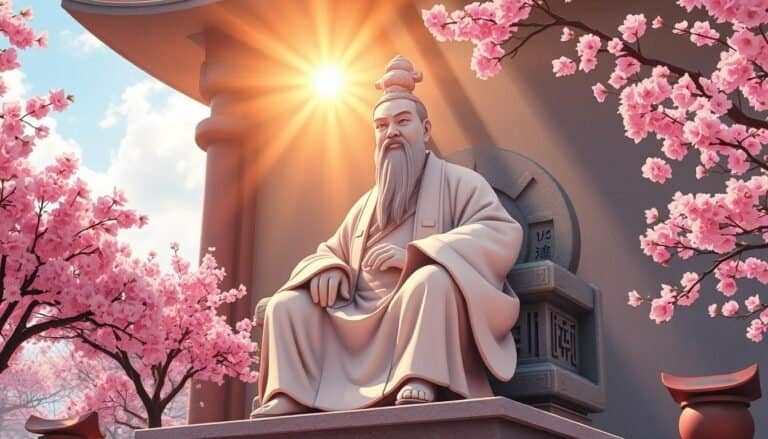Eastern Philosophy: An Introduction to Confucianism
Have you ever thought about how a philosophy that values virtue, family ties, and tradition impacts today’s society? This article will take you into the world of Eastern Philosophy, focusing on Confucianism. It’s a key part of Chinese thought that still shapes our lives. We’ll look at how Confucianism answers big questions about being human, right and wrong, and what makes life meaningful.
Confucianism is seen as a practical way to live ethically. It stands out by focusing on growing virtues and the power of relationships. This piece will go beyond just explaining Confucian teachings. It will show how these old ideas still affect our modern world.
Key Takeaways
- Confucianism emphasizes the cultivation of personal virtues and social harmony.
- It is rooted in the teachings of classical Chinese philosophers, including Confucius and Mencius.
- The philosophy highlights the significance of family and societal roles in shaping moral behavior.
- Confucianism contrasts with other systems by focusing on practical life challenges rather than metaphysical questions.
- Its principles influence various aspects of modern life, especially in Eastern societies.
- Understanding Confucianism offers insight into the broader realm of Eastern philosophical thought.
Understanding Eastern Philosophy
Eastern Philosophy covers a wide range of ideas from Asia, different from Western thought. It looks at life as a whole, focusing on ethics, metaphysics, and community. It explores human and cosmic relationships deeply, affecting both individuals and groups.
Confucianism is a key part of this philosophy. It teaches values like harmony, respect for tradition, and doing what’s right. It stresses the importance of how we relate to each other, aiming to build a harmonious society.
Eastern Thought stands out with its unique themes. Here are some key points:
- Relational Nature: It sees everything as connected.
- Holistic Approach: It looks at the big picture, not just parts.
- Ethics and Morality: These are part of everyday life, guiding how we act.
- Cultural Nuances: It varies a lot across regions, showing local traditions.
Eastern Philosophy explores big ideas in religion and philosophy, like Buddhism, Hinduism, Daoism, and Confucianism. This mix of thought tackles deep questions and everyday issues. It looks at things like how to live, family, and society.
| Philosophical System | Main Concepts | Historical Impact |
|---|---|---|
| Confucianism | Ritual, social harmony, moral duty | Influenced Eastern societal frameworks; education system |
| Buddhism | Suffering, enlightenment, compassion | Introduced practices of mindfulness and ethics |
| Daoism | Natural order, yin-yang, simplicity | Contributed to arts and sciences; holistic understanding |
| Hinduism | Dharma, karma, samsara | Shaped religious practices and texts in Asia |
Learning about these philosophies helps us appreciate Eastern thought more. It shows how it has shaped culture and society.
What is Confucianism?
Confucianism is a key part of Chinese philosophy. It gives a special view on morality, leadership, and keeping society together. It comes from the teachings of Confucius, who lived from 551 to 479 B.C.E. He taught the importance of being ethical, learning, and growing in virtue.
At the heart of Confucianism are the Confucian Principles. These principles push for a society that works well together. They say that how we treat each other matters a lot.
Core Beliefs and Principles
Confucianism is all about two main ideas: ren and li. Ren means being kind and doing what’s best for others. Li is about following rules and being polite to keep society in order.
Confucius lived during a time of big changes in China. The country was divided into four social groups. This led him to look for ways to make society more stable and moral.
He wanted to bring back the cultural and moral values of the past. This was when the idea of the mandate of heaven was important in ruling and authority.
The Historical Context of Confucianism
For over two thousand years, Confucianism has spread beyond China to places like Korea, Japan, and Vietnam. Emperor Wu Di made it the official philosophy during the Han Dynasty. It became important in education and politics.
Over time, Confucianism changed but stayed powerful in China’s history. Even when Chairman Mao Zedong was in power, Confucian ideas were still there. Now, the modern Chinese government sees them as helpful for today’s society.
The Foundation of Confucian Teachings
Confucianism started over 2500 years ago. It offers teachings based on ethics that still guide us today. These teachings mix personal behavior, social peace, and learning. At the heart are the Five Relationships, which show how to act with others, stressing order and shared duties.
Confucius lived from 551 to 479 BCE and aimed to bring back a golden age’s values and rituals. He saw Ren (humanity), Li (rituals), and Xiao (filial piety) as key to a good society. He also stressed the value of learning and improving oneself to find peace.
In the Han dynasty (202 BCE – 220 CE), Confucianism became the main belief of the state. It shaped education with the Five Classics. These texts taught the elite, spreading Confucian values far and wide. Dong Zhongshu linked Confucianism with cosmic ideas like yin and yang, adding depth to Eastern Philosophy.
Confucian ethics are built on Tian (heaven) and Junzi (noble behavior). Confucius’ teachings still help us live in harmony, respect, and responsibility. These values are important in China and around the world.
| Confucian Principle | Description |
|---|---|
| Ren (Humanity) | Emphasizes compassion and empathy towards others. |
| Li (Rituals) | Focuses on proper conduct and the importance of ceremonies in social life. |
| Xiao (Filial Piety) | Highlights the respect and duty children owe to their parents and ancestors. |
| Wu Lun (Five Relationships) | Guides ethical interactions between ruler and subject, father and son, husband and wife, older and younger siblings, and friends. |
Key Confucian Principles
Exploring Confucian Principles shows how deeply they affect ethics and social behavior. Ren, Li, and Xiao are key to these teachings. They help build personal integrity and social unity.
Ren: The Concept of Benevolence
Ren is seen as the heart of Confucianism. It stands for kindness, empathy, and compassion. It teaches us to put others first, creating a peaceful society.
By being kind, we connect deeply with our families and communities. This leads to a life filled with shared values.
Li: The Importance of Ritual and Social Etiquette
Li guides our actions, showing the value of rituals and good manners. It helps keep society in order. It teaches respect, honor, and moral integrity.
Following Li builds our character and strengthens our community ties. It shows the true spirit of Confucian teachings.
Xiao: Filial Piety in Confucianism
Xiao means showing respect and gratitude to our elders and ancestors. It’s a key part of Confucian teachings. It stresses the importance of family roles and responsibilities.
Keeping Xiao means honoring the values passed down through generations. It shows respect in the family and preserves cultural traditions.
Confucianism Introduction in Modern Society
Confucianism is still very important today, showing its lasting impact in Eastern Philosophy. It has come back in many areas like education, government, and business in East Asia. This shows how Confucianism can fit with today’s values while keeping its original teachings.
In schools, they teach Confucian values like respecting teachers and seeking knowledge. These values help create leaders who are ethical. Many teachers believe in teaching morals based on Confucian teachings. This helps with personal and community ethics.
The Asian tiger economies are a good example of Confucian capitalism. They mix free market ideas with government support. This creates a society that values social order.
There’s a lot of talk about Confucianism’s role in today’s world, especially in politics. Politicians who follow Confucian ideas push for community responsibility and moral leadership. Experts look into how Confucianism promotes kind leadership. This builds trust and stability in communities.
Confucius’ teachings are becoming popular again, catching the eye of scholars from East and West. Books like “History of Chinese Philosophy” by Feng Youlan and ideas from Mou Zongsan and Xiong Shili have sparked new talks. They show how Confucianism could be an alternative to today’s capitalism.
This comeback shows the value of learning from history to tackle today’s problems. Modern Confucianism aims to mix old values with new uses. It proves that Confucianism is a living, important philosophy in our global world today.
Differences Between Confucianism and Other Eastern Philosophies
Confucianism is unique in its focus on respect, duty, and social harmony. It differs from other Eastern philosophies like Daoism and Buddhism. These differences show in their views on life and personal goals.
Comparative Analysis with Daoism
Daoism values being in tune with nature and the idea of wuwei, or effortless action. Confucianism, however, stresses the need to act and follow societal norms. While Daoism suggests a natural flow, Confucianism sees value in structured social roles. These views lead to different paths for finding happiness and peace.
Confucianism vs. Buddhism: Key Distinctions
Confucianism and Buddhism have distinct views on the self and enlightenment. Buddhism sees enlightenment through self-reflection and overcoming personal desires. It’s a journey within. Confucianism, however, believes in growing through social interaction and rituals that help the community. Respect is key in Confucian thought, shaping how we relate to others, unlike Buddhism’s focus on individual spiritual paths.
| Philosophy | Main Focus | Key Principle | View on Society | Self-Concept |
|---|---|---|---|---|
| Confucianism | Social harmony and moral conduct | Ren (benevolence) | Structured, with well-defined roles | Self cultivated through relationships |
| Daoism | Harmony with nature | Wuwei (non-action) | Fluid and spontaneous | Self connected with nature |
| Buddhism | Personal enlightenment | Overcoming desire | Often solitary and individualistic | Self transcends through inner work |
These differences highlight how societies and their moral values vary. They also show the impact of these philosophies on communities in East Asia and beyond.
Evolving Interpretations of Confucianism in History
Confucianism has changed a lot over time, making it still important today. Neo-Confucianism was key in this change. It mixed Confucian teachings with Buddhism and Daoism. This mix helped answer new spiritual and social needs.
Neo-Confucianism’s Influence
Neo-Confucianism brought new life to Confucian ideas during the Song Dynasty (960–1279) and later. Scholars like Xiong Shili were important in this revival. His work, New Treatise on the Uniqueness of Consciousness, from 1932, was a big step forward.
His students, Mou Zongsan and Tang Junyi, built on these ideas. They looked into human consciousness and morality. These ideas are key to modern Confucian teachings.
The Impact of Modernization on Confucian Thought
Modern times have changed Confucian thought a lot. The growth of East Asia’s economy over the last century made people look back at Confucian values. Chenyang Li talked about harmony, which was very relevant then.
Since the 1980s, there has been a lot of debate about Confucian identity. People were trying to keep their traditional values while also embracing Western ideas.
Conclusion
We’ve looked into how Confucianism has shaped history and today’s world. It’s a key part of ethics and social talks. Confucius started it in 551 BCE, and it still guides us on being moral and working together.
Confucianism has changed over time, like during the Song period’s revival. It teaches us about being a good leader and community member. It focuses on *Ren*, *Li*, and *Xiao*, which are about being a good person and caring for others.
Today, Confucius’ teachings help us deal with big issues like ethics and how we treat each other. By following Confucian values, we can build a society that’s fair and peaceful. It helps us live together better in a world full of different people.
Source Links
- Eastern Philosophy: An Introduction
- Eastern philosophy
- An Introduction to Confucianism
- Understanding Eastern Philosophy
- Confucianism
- Confucianism | Meaning, History, Beliefs, & Facts
- Asia for Educators | Columbia University
- Living in the Chinese Cosmos
- Confucianism: Introduction to Chinese Philosophy and Ethics
- Confucianism
- Book.pdf
- An Introduction to Confucius’ Life & Thought Through Two Animated Videos
- Confucian Thought and Contemporary Western Philosophy
- Modern Confucianism
- Intersecting Perspectives: A Comparative Dialogue on Respect in Confucian and Western Philosophies
- Confucianism: Philosophy and Influence in East Asia
- [PDF] An introduction to Confucianism | Semantic Scholar
- Confucius







